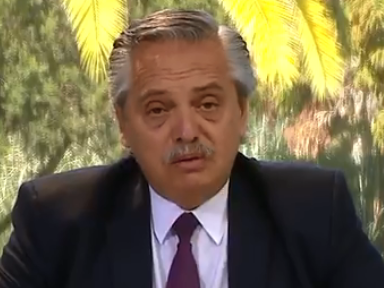
Twelve current and former world leaders are among those calling on the UK Government to end extradition proceedings against Julian Assange, arguing that he should not be prosecuted for his political opinions or actions as a publisher.
The president of Argentina Alberto Fernández (pictured) joined former Labour leader Jeremy Corbyn and 159 other heads of state, diplomats, ministers and parliamentarians past and present to object to the ongoing prosecution as it entered its third week at the Old Bailey.
The letter was also signed by Rafael Correa, who was president of Ecuador when Assange entered his country’s London embassy in 2012, and diplomat Fidel Naváez who worked at the consul during the Wikileaks founder’s almost seven-year asylum.
Among the other prominent signatories are former Spanish prime minister José Luis Zapatero, former Brazilian presidents Dilma Rousseff and Luiz Inácio Lula da Silva, and other former heads of state from Bolivia, Colombia, the Dominican Republic, Panama, Paraguay, Uruguay and Venezuela.
Lula da Silva said: “Assange needs to be defended by all of us who love democracy, who love freedom of the press, freedom of trade unions, who love freedom of organisation.”
Support also came from leaders in the likes of Australia, France, Germany, Ireland and Switzerland and, in the UK, Corbyn’s former deputy John McDonnell and controversial ex-MP George Galloway.
The politicians backed a letter previously sent to Prime Minister Boris Johnson, Home Secretary Priti Patel, Foreign Secretary Dominic Raab and Justice Secretary Robert Buckland by a group of lawyers setting out why they believe the extradition of Assange to the US would be illegal.
They said that extradition on the basis of the charges faced by Assange would “gravely endanger freedom of the press, a cornerstone of European democracies”.
Among the lawyers’ other concerns were that the Wikileaks founder risks being subjected to an unfair “show” trial in the US followed by torture and degrading punishment of up to 175 years in prison, that his right to a fair trial in the UK has already been impeded, and that nonetheless the US-UK Extradition Treaty prohibits it being used for political offences.
Assange, 49, is battling 17 charges under the US Espionage Act 1917, as well as an 18th charge alleging he plotted to hack computers.
A petition launched by Reporters Without Borders has more than doubled its signatures against extradition to more than 160,000 since the start of the hearing at the Old Bailey two weeks ago.
The organisation, along with Assange’s partner Stella Moris, will attempt to deliver the petition to Downing Street again at the end of proceedings, after a failed attempt at the start.
Former Australian PM Kevin Rudd has also previously spoken out in support of Assange.
He said: “If their case is essentially that Mr Assange broke the law by obtaining and disclosing secret information, then I struggle to see what separates him from any journalist who solicits, obtains and publishes such information.
“This includes the editors of the many American media outlets that reported the material… why should Mr Assange be tried, convicted and incarcerated while those who publicly release the information are afforded protection under provisions of the US constitution concerning press freedom?”
Email pged@pressgazette.co.uk to point out mistakes, provide story tips or send in a letter for publication on our "Letters Page" blog
